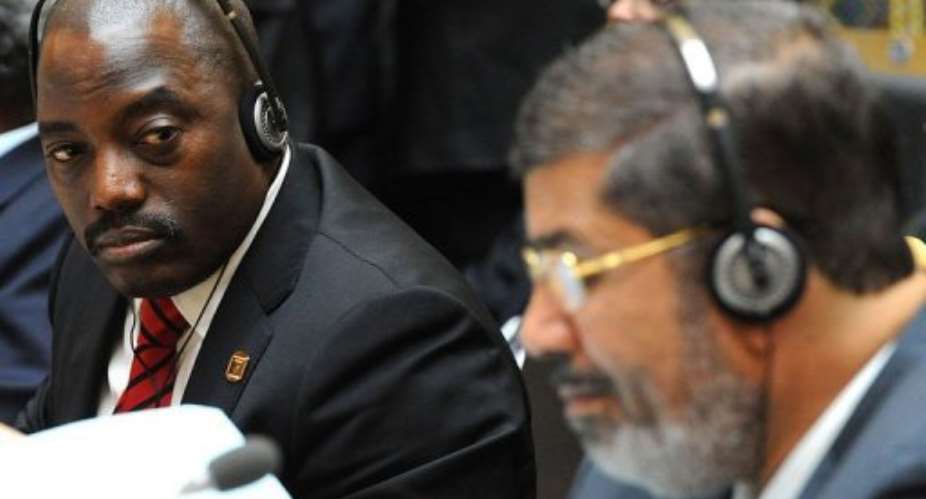ADDIS ABABA (AFP) - Kinshasa and Kigali have agreed to accept an international force to neutralise militias in eastern DR Congo and patrol their border, Rwandan President Paul Kagame told AFP Sunday.
"We agreed in principle to ask for others to help, but the details... will come later," Kagame said, speaking after his first face-to-face meeting with DR Congo President Joseph Kabila since Kigali was accused of supporting Congolese rebels.
Kagame, speaking after an hour-long meeting of the regional bloc, the International Conference on the Great Lakes Region (ICGLR), said the "meeting went very well."
The meeting was held on the sidelines of the African Union summit in the Ethiopian capital, where the renewed violence by M23 and FDLR rebels in the mineral-rich eastern DR Congo is a key focus.
Kinshasa accuses Rwanda of backing M23, while Kigali accuses the DR Congo of supporting the FDLR.
The proposal for a neutral force was first put forward at a meeting last week of foreign ministers from the 11-nation member ICGLR, and endorsed Sunday by heads of state at the meeting.
The leaders agreed to "to work with the AU and the UN for an immediate establishment of a neutral international force to eradicate M23, FDLR" and all other armed groups operating in eastern DR Congo, an official statement from the bloc said.
The United Nations already has peacekeepers from the MONUSCO force in DR Congo deployed in the areas where the armed groups are.
The proposed new force will also "patrol and secure the border zones," the statement added, but officials have given no details on its size, mandate, date of deployment, where the troops would come from, or how it would dovetail with the UN force.
Kabila's government has accused high-ranking Rwandan officers of supporting a rebellion by soldiers who mutinied from DR Congo's regular army.
The allegations echo the findings of a UN panel of experts who last month said Rwanda was supplying arms and fighters to the rebels.
Rwanda has denied involvement and in turn accuses Kinshasa of renewing cooperation with Rwandan FDLR Hutu rebels, who have been based in eastern DR Congo since the 1994 Rwandan genocide.
The ICGLR comprises Angola, Burundi, Central African Republic, Republic of Congo, Democratic Republic of Congo, Kenya, Uganda, Rwanda, Sudan, Tanzania and Zambia.
The regional powers agreed to meet again to discuss the force on August 6 in Uganda.





 Former Kotoko Player George Asare elected SRC President at PUG Law Faculty
Former Kotoko Player George Asare elected SRC President at PUG Law Faculty
 2024 elections: Consider ‘dumsor’ when casting your votes; NPP deserves less — P...
2024 elections: Consider ‘dumsor’ when casting your votes; NPP deserves less — P...
 You have no grounds to call Mahama incompetent; you’ve failed — Prof. Marfo blas...
You have no grounds to call Mahama incompetent; you’ve failed — Prof. Marfo blas...
 2024 elections: NPP creates better policies for people like us; we’ll vote for B...
2024 elections: NPP creates better policies for people like us; we’ll vote for B...
 Don’t exchange your life for wealth; a sparkle of fire can be your end — Gender ...
Don’t exchange your life for wealth; a sparkle of fire can be your end — Gender ...
 Ghana’s newly installed Poland train reportedly involved in accident while on a ...
Ghana’s newly installed Poland train reportedly involved in accident while on a ...
 Chieftaincy disputes: Government imposes 4pm to 7am curfew on Sampa township
Chieftaincy disputes: Government imposes 4pm to 7am curfew on Sampa township
 Franklin Cudjoe fumes at unaccountable wasteful executive living large at the ex...
Franklin Cudjoe fumes at unaccountable wasteful executive living large at the ex...
 I'll 'stoop too low' for votes; I'm never moved by your propaganda — Oquaye Jnr ...
I'll 'stoop too low' for votes; I'm never moved by your propaganda — Oquaye Jnr ...
 Kumasi Thermal Plant commissioning: I pray God opens the eyes of leaders who don...
Kumasi Thermal Plant commissioning: I pray God opens the eyes of leaders who don...
